
Our Lost Generation is shedding light on the Karen and BLM for future generations
By CJ Sommerfeld, Staff Writer
If we can emulate anything from the Roaring Twenties, let it not be mass consumerism, but instead why not abandon old ways and adopt this raw perspective which the original Lost Generation had.
Recently, I have seen a lot of articles which speculate that our post-pandemic life will be comparable to that of the Roaring Twenties. That is, the period of time following WWI when the world witnessed massive economic growth (introducing consumerism), great advancements in the arts, as well as a transition to a value system that rejected the past. These are just a few elements that defined this era. But, while the end of the war was a breath of fresh air for most, those who were reaching maturity when it began came out of it disillusioned as most of what they had been taught about the world had been proven wrong during the war. This group of youngsters quickly transformed to be the progressive voices of the time and were later referred to as the Lost Generation. We too, have these radical voices among us.
To be fair, Millennials have already been called the modern Lost Generation. This was because of something that occurred before anyone had ever heard of COVID. We gained this title since we entered the workforce during the worst economic depression, since, well, the Great Depression. I believe the modern Lost Generation, however, is a title that belongs to those younger than most Millennials. Let’s say, the last years of Millennial-hood that tapered-off into the Gen Z era, and a couple years beyond that… 1990-2000 or so.
Out of the original Lost Generation evolved a group of writers and artists who began creating works reflective of their battered world views. They abandoned many of the old traditions which seemed to have betrayed the whole world, and instead let their new perspectives direct them. Visual works from this time were not idealized like they had been previously, but instead depicted dark, raw, and real portrayals of life. As for literary works, many criticized this new-found consumerism and wealth that occurred after WWI. One novel worth noting is The Great Gatsby which criticizes the wealthy and sheds light on the false optimism which was previously connotated with the Colonial American Dream. You could say that these Lost Generation artists exchanged a rosy perspective for one much truer after WWI ended.
Now, coronavirus has not only made young people re-think economics (for example personal spending and saving), but also their job choices (What work is essential? What work can I do from my living room?) Larger, and frankly more important than both of these, are the grassroots matters that society seemed to have gotten so conditioned to. During covid some very important issues got brought to the public’s attention: the BLM movement, the Karen trope, and subsequently cancel culture (which had been lingering for a bit but is now in full swing). While I do not entirely side with everything that cancel culture has done, I can see that it is rooted in something progressive. Because of the public attention which these issues have garnered, those who choose to can work together to try and extinguish them.
WWI wrung the young people of the time dry of anything flowery and left grittiness and rawness, allowing them to see the world for what it was. In current days, racial inequalities and treatments have been so thoroughly woven into Western society, it is about time that such a large uprising has occurred. If we can emulate anything from the Roaring Twenties, let it not be mass consumerism, but instead why not abandon old ways and adopt this raw perspective which the original Lost Generation had. By opening a blind eye, we can recognize the flaws in society that we have become so accustomed to, and ultimately work towards social justice. Those who create works that speak about these issues are our Lost Generation.


